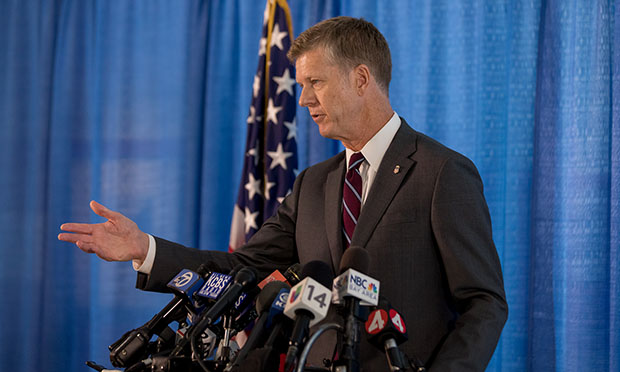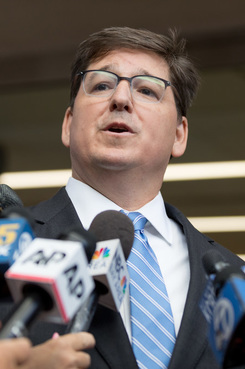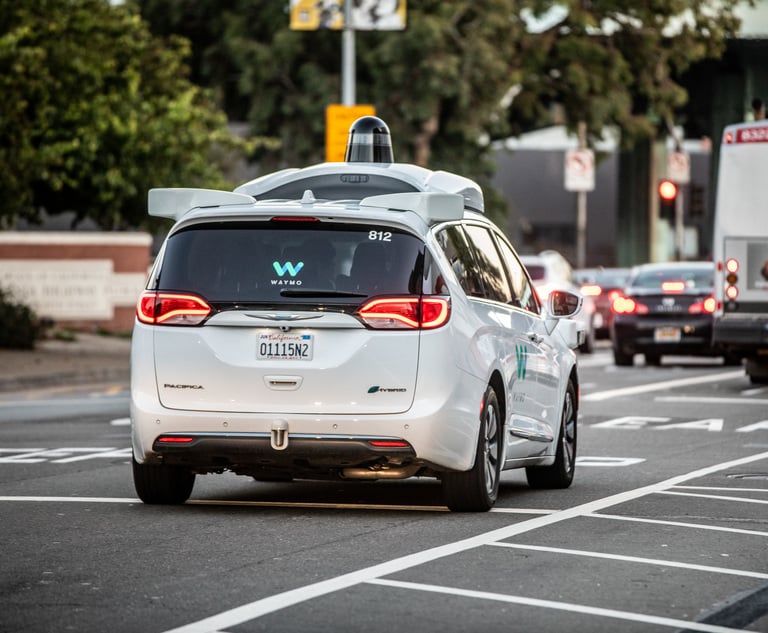Ex-Autonomous Vehicle Engineer for Google and Uber Charged With Trade Secret Theft
Anthony Levandowski is accused of stealing thousands of files related to driverless car technology as he departed from Google. Levandowski asserted his Fifth Amendment right not to incriminate himself in Google's trade secret dispute with Uber, which purchased the startup company he founded after his departure from Google.
August 27, 2019 at 01:50 PM
4 minute read
 David Anderson, U.S. Attorney for the Northern District of California, at a press conference announcing federal charges against former Google engineer Anthony Levandowski on Aug. 27, 2019. (Photo: Jason Doiy/ALM)
David Anderson, U.S. Attorney for the Northern District of California, at a press conference announcing federal charges against former Google engineer Anthony Levandowski on Aug. 27, 2019. (Photo: Jason Doiy/ALM)
Anthony Levandowski, the former head of Google's autonomous vehicle unit who was at the center of the company's high-profile dispute with Uber Technologies, has been hit with federal trade-secret theft charges.
In an indictment returned Aug. 15 and unsealed Monday, Levandowski faces 33 counts of stealing or trying to steal Google's trade secrets. The indictment claims that Levandowski, a founding member of Google's "Project Chauffeur" autonomous vehicle project, had decided to leave the company no later than September 2015 and used the time up until his January 2017 departure to take thousands of company files from Google.
"All of us have the right to change jobs," said U.S. Attorney David Anderson of the Northern District of California, in a press statement announcing the charges. "None of us has the right to fill our pockets on the way out the door. Theft is not innovation."
Anderson said at a press conference Tuesday morning that both Uber and Google had been "responsive" to the office's investigation and requests for documents.
Levandowski was allowed to self-surrender and is set to be arraigned at 1:30 p.m. Tuesday before U.S. Magistrate Judge Nathanael Cousins.
Levandowski was a pivotal—though silent—player in the civil dispute between Google's Waymo subsidiary and Uber. Waymo accused Levandowski of downloading 14,000 company files before leaving Google in 2016 to start a new company, Otto, which he quickly sold to Uber for $680 million. Levandowski formally invoked his Fifth Amendment right against self-incrimination in the civil dispute and refused to provide testimony. That decision resulted in Levandowski being first removed from all development of laser-based vision technology at Uber in April 2017, and then terminated by the company the next month. U.S. District Judge William Alsup of the Northern District of California, who oversaw the civil dispute, referred the case to the U.S. Attorney's Office for a potential criminal probe.
 Miles Ehrlich. (Photo: Jason Doiy/ALM)
Miles Ehrlich. (Photo: Jason Doiy/ALM)Levandowski's lawyers, Ismail Ramsey and Miles Ehrlich of Ramsey & Ehrlich, said in a written statement that their client is innocent and they look forward to defending him at trial.
"This case rehashes claims already discredited in a civil case that settled more than a year and a half ago," they said. "The downloads at issue occurred while Anthony was still working at Google—when he and his team were authorized to use the information. None of these supposedly secret files ever went to Uber or to any other company."
Levandowski is also being represented by Cristina Arguedas of Arguedas, Cassman, Headley & Goldman.
A spokesperson from Uber said the company has been cooperating with the government's investigation and will continue to do so.
A spokesperson for Waymo said that the company has "always believed competition should be fueled by innovation, and we appreciate the work of the U.S. Attorney's Office and the FBI on this case."
Uber ultimately agreed to pay about $244.8 million in stock to Waymo one week into what was expected to be a three-week trial and to have an independent monitor ensure that no Waymo technology made its way into its autonomous vehicle program. Uber disclosed in its initial public offering documents that it could possibly be on the hook for an additional $127 million award Google won against Levandowski in arbitration—an award Levandowski's lawyers claimed Uber owed as part of an indemnification agreement included in the deal to purchase Levandowski's company.
The federal criminal case is being prosecuted by Assistant U.S. Attorneys Katherine Wawrzyniak, Andrew Dawson and Amie Rooney, members of the corporate fraud strike force launched by Anderson earlier this year to investigate and prosecute white-collar cases.
NOT FOR REPRINT
© 2025 ALM Global, LLC, All Rights Reserved. Request academic re-use from www.copyright.com. All other uses, submit a request to [email protected]. For more information visit Asset & Logo Licensing.
You Might Like
View All
Shareholder Democracy? The Chatter Musk’s Tesla Pay Case Is Spurring Between Lawyers and Clients
6 minute read
Willkie Farr & Gallagher Drives Legal Challenge for Uber Against State's Rideshare Laws
5 minute read

EPA grants California authority to ban sales of new gas cars by 2035. Action faces reversal by Trump
Trending Stories
- 1‘Catholic Charities v. Wisconsin Labor and Industry Review Commission’: Another Consequence of 'Hobby Lobby'?
- 2With DEI Rollbacks, Employment Lawyers See Potential For Targeting Corporate Commitment to Equality
- 3In-House Legal Network The L Suite Acquires Legal E-Learning Platform Luminate+
- 4In Police Shooting Case, Kavanaugh Bleeds Blue and Jackson ‘Very Very Confused’
- 5Trump RTO Mandates Won’t Disrupt Big Law Policies—But Client Expectations Might
Who Got The Work
J. Brugh Lower of Gibbons has entered an appearance for industrial equipment supplier Devco Corporation in a pending trademark infringement lawsuit. The suit, accusing the defendant of selling knock-off Graco products, was filed Dec. 18 in New Jersey District Court by Rivkin Radler on behalf of Graco Inc. and Graco Minnesota. The case, assigned to U.S. District Judge Zahid N. Quraishi, is 3:24-cv-11294, Graco Inc. et al v. Devco Corporation.
Who Got The Work
Rebecca Maller-Stein and Kent A. Yalowitz of Arnold & Porter Kaye Scholer have entered their appearances for Hanaco Venture Capital and its executives, Lior Prosor and David Frankel, in a pending securities lawsuit. The action, filed on Dec. 24 in New York Southern District Court by Zell, Aron & Co. on behalf of Goldeneye Advisors, accuses the defendants of negligently and fraudulently managing the plaintiff's $1 million investment. The case, assigned to U.S. District Judge Vernon S. Broderick, is 1:24-cv-09918, Goldeneye Advisors, LLC v. Hanaco Venture Capital, Ltd. et al.
Who Got The Work
Attorneys from A&O Shearman has stepped in as defense counsel for Toronto-Dominion Bank and other defendants in a pending securities class action. The suit, filed Dec. 11 in New York Southern District Court by Bleichmar Fonti & Auld, accuses the defendants of concealing the bank's 'pervasive' deficiencies in regards to its compliance with the Bank Secrecy Act and the quality of its anti-money laundering controls. The case, assigned to U.S. District Judge Arun Subramanian, is 1:24-cv-09445, Gonzalez v. The Toronto-Dominion Bank et al.
Who Got The Work
Crown Castle International, a Pennsylvania company providing shared communications infrastructure, has turned to Luke D. Wolf of Gordon Rees Scully Mansukhani to fend off a pending breach-of-contract lawsuit. The court action, filed Nov. 25 in Michigan Eastern District Court by Hooper Hathaway PC on behalf of The Town Residences LLC, accuses Crown Castle of failing to transfer approximately $30,000 in utility payments from T-Mobile in breach of a roof-top lease and assignment agreement. The case, assigned to U.S. District Judge Susan K. Declercq, is 2:24-cv-13131, The Town Residences LLC v. T-Mobile US, Inc. et al.
Who Got The Work
Wilfred P. Coronato and Daniel M. Schwartz of McCarter & English have stepped in as defense counsel to Electrolux Home Products Inc. in a pending product liability lawsuit. The court action, filed Nov. 26 in New York Eastern District Court by Poulos Lopiccolo PC and Nagel Rice LLP on behalf of David Stern, alleges that the defendant's refrigerators’ drawers and shelving repeatedly break and fall apart within months after purchase. The case, assigned to U.S. District Judge Joan M. Azrack, is 2:24-cv-08204, Stern v. Electrolux Home Products, Inc.
Featured Firms
Law Offices of Gary Martin Hays & Associates, P.C.
(470) 294-1674
Law Offices of Mark E. Salomone
(857) 444-6468
Smith & Hassler
(713) 739-1250






